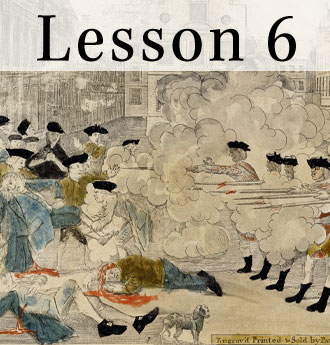The Resource Center » Level 3 » Unit 1 »
Lesson 6: Why Did American Colonists Want to Free Themselves from Great Britain?

Lesson Purpose
The growth of the American colonies raised issues with the parent country, Great Britain, that were difficult to resolve peacefully. This lesson describes the circumstances that produced the Declaration of Independence and the major ideas about government and natural rights included in that document.
Lesson Objectives
When you have finished this lesson, you should be able to
- describe the British policies that some American colonists believed violated basic principles of constitutional government and their rights as Englishmen,
- explain why Americans resisted those policies and how that resistance led to the Declaration of Independence,
- evaluate the arguments that the colonists made to justify separation from Great Britain, and
- evaluate, take, and defend positions on violations of colonists’ rights before the Revolution and important questions about the meaning and implications of the Declaration of Independence.
Lesson Terms
compact
A formal contract or agreement between or among two or more parties or states. The Mayflower Compact of 1620 was such a formal agreement.
law of nature
sovereignty
writ of assistance
Lesson Biographies
Locke, John (1632-1704 CE)
John Locke, a physician and philosopher, worked with famous scientists, including Robert Boyle and Robert Hooke. In contrast to Hobbes, Locke used state of nature and social contract theory to justify limited government and the preservation of individual rights, particularly life, liberty, and property. Locke is sometimes called "America's philosopher" because his Second Treatise of Government (1690) was widely read by the colonists and important ideas found in it (as well as in works of English republican writers) are found in the Declaration of Independence, especially his theories of natural rights and his defense of violent revolution after "a long train of abuses" of power by rulers. Two verbatim phrases of Locke's are found in the Declaration.
Franklin, Benjamin (1706-1790 CE)
Otis, James (1725-1783 CE)
Revere, Paul (1735-1818 CE)
Paine, Thomas (1737-1809 CE)
Jefferson, Thomas (1743-1826 CE)
Dawes, William (1745-1799 CE)
Lesson Primary Sources
Jefferson's Original Draft of the Declaration of Independence
Jefferson's Original Draft of the Declaration of Independence
Jefferson to Edmund Pendleton 1776
Thomas Paine--Common Sense, 1776
Thoughts on Government, Applicable to the Present State of the American Colonies--John Adams, 1776
Albany Plan of Union 1754
Articles of Association 1774
Declaration of Rights and Grievances of the First Congress of the American Colonies, 1765
The Rights of the British Colonies Asserted and Proved--James Otis Jr., 1764
Royal Proclamation of 1763
Stamp Act of 1765
Declaratory Act of 1766
Quartering Act of 1765
Quartering Act of 1774
Edmund Burke's Speech to the Electors at Bristol, 1774
Olive Branch Petition
Circular Letter of the Boston Committee of Correspondence
Association of the Sons of Liberty of New York, 1773
Boston Port Act, 1774
Massachusetts Government Act, 1774
The Administration of Justice Act
Quebec Act
Declaration of Independence 1776






